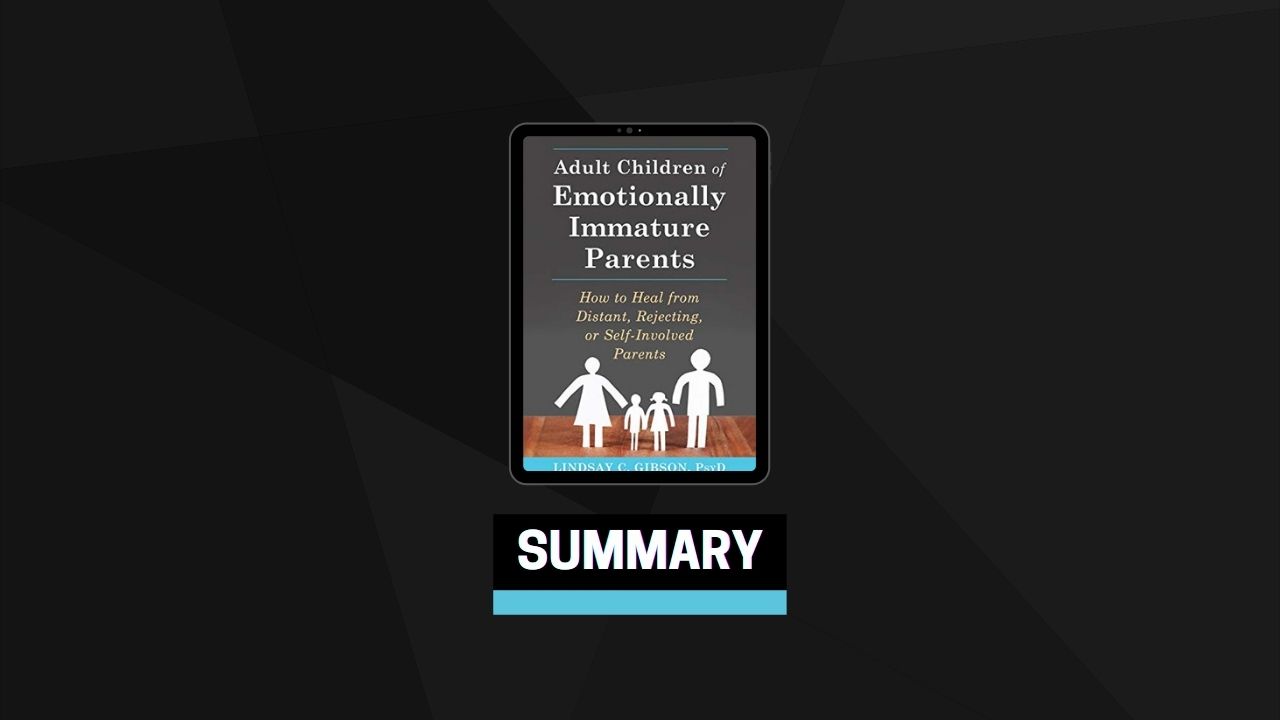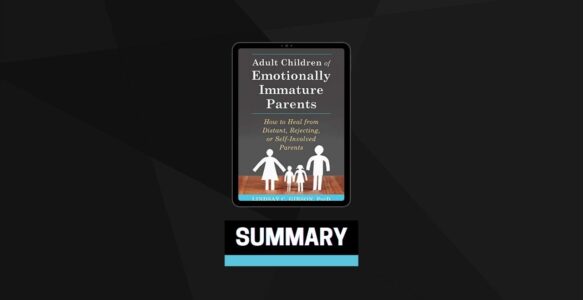Kindle | Hardcover | Audiobook
How Emotionally Immature Parents Affect Their Adult Children’s Lives
A lack of emotional intimacy creates emotional loneliness in both children and adults. Attentive and reliable emotional relationships are the basis of a child’s sense of security. Unfortunately, emotionally immature parents are usually too uncomfortable with closeness to give their children the deep emotional connection they need. Parental neglect and rejection in childhood can adversely affect self-confidence and relationships in adulthood, as people repeat old, frustrating patterns and then blame themselves for not being happy. Even adult success doesn’t completely erase the effects of parental disconnection earlier in life.
Understanding how your parent’s emotional immaturity has affected you is the best way to avoid repeating the past in your adult relationships. To that end, in the next chapter we’ll look at the hallmark characteristics of emotionally immature parents.
Recognizing the Emotionally Immature Parent
Emotional immaturity is a real phenomenon that has been studied and written about for a long time. It undermines people’s ability to deal with stress and to be emotionally intimate with others. Emotionally immature people often grew up in a family environment that curtailed their full emotional and intellectual development. As a result, they have an oversimplified approach to life, narrowing situations down to fit their rigid coping skills. Having such a limited sense of self makes them egocentric and undermines their ability to be sensitive to other people’s needs and feelings. Their reactive emotions, lack of objectivity, and fear of emotional intimacy can make close relationships difficult, especially when it comes to their children.
How It Feels to Have a Relationship with an Emotionally Immature Parent
Emotionally immature people have a poor sense of personal history and resist being accountable for their past actions or future consequences. Lacking a firm sense of self, they think family closeness means enmeshment, with people existing to mirror each other. Real communication is nearly impossible because of their poor empathy and rigid emphasis on roles. They neglect relationship repair and reciprocity and shirk the emotional work necessary to be sensitive to other people. Instead, they focus on whether others seem to make them look good or bad. Defending against anxiety trumps relating authentically to other people, including their children.
Types of Emotionally Immature Parents
emotionally immature parents are self-involved and insensitive and therefore emotionally unavailable to their children. Their lack of empathy makes them hard to communicate with and difficult to connect with. They’re all afraid of genuine emotion and seek to control others for their own comfort. None of them make their children feel emotionally seen. All are draining to be around in their own ways, and ultimately all interactions center around them. In addition, all are incapable of true interpersonal reciprocity.
How Different Children React to Emotionally Immature Parenting
Children have different ways of reacting to emotionally immature parenting, but they all develop subconscious healing fantasies about how things could get better. If a child’s true self isn’t accepted, the child will also adopt a role-self as a way of having a valuable part to play in the family. In addition, children develop two main coping styles in response to emotionally immature parenting: externalizing or internalizing. Externalizers think the solutions to their problems will come from outside themselves, while internalizers tend to look within themselves to solve problems. Either style might be advantageous in the moment, but internalizing is far less likely to create conflict or subject other people to hardship. Instead, the internalizer’s difficulties are much more likely to result in inner distress.
What It’s Like to Be an Internalizer
Internalizers are highly perceptive and extremely sensitive to other people. Because of their strong need to connect, growing up with an emotionally immature parent is especially painful for them. Internalizers have strong emotions but shrink from bothering other people, making them easy for emotionally immature parents to neglect. They develop a role-self that’s overly focused on other people, along with a healing fantasy that they can change others’ feelings and behaviors toward them. They get by on very little support from others and end up doing too much emotional work in their relationships, which can lead to resentment and exhaustion.
Breaking Down and Awakening
The true self will find ways to express itself, even in the face of efforts to play a role or live out a healing fantasy. When people have ignored their true self for too long, they may develop psychological symptoms. Waking up to the needs of the true self can initially feel like breaking down. Panic, anger, and depression are just a few symptoms that may signal an emotional awakening to better self-care and healthier values. When people process their childhood issues and wake up to their strengths, they gain the confidence to start living from their true self.
How to Avoid Getting Hooked by an Emotionally Immature Parent
Our early dependence on our parents makes us seek their love and attention. However, we must step away from our childhood roles if we don’t want to repeat them in our adult relationships. The maturity awareness approach will help you deal with an emotionally immature parent—or any difficult, self-involved person—more effectively. You’ll have better results if you try to relate to your parent in a neutral way, rather than trying to have a relationship. First, you need to assess your parent’s level of maturity and approach interactions between the two of you from an observational perspective—focusing on thinking, rather than reacting emotionally. Then you can employ the three steps involved in the maturity awareness approach: expressing yourself and then letting it go; focusing on the outcome rather than the relationship; and managing the interaction rather than engaging emotionally.
How It Feels to Live Free of Roles and Fantasies
Although you may have learned to reject yourself thanks to an overly critical inner voice that expects perfection, you can reclaim your true self and genuine thoughts and feelings regardless of other people’s reactions. You can claim the freedom to express yourself and take action on your own behalf. You’re free to extend compassion to yourself and even grieve what you’ve lost as a result of having emotionally immature parents. You now know that your first job is your own self-care, including setting limits on how much you give, even to the point of suspending contact with your parents if necessary. You no longer have to exhaust yourself with excessive empathy for other people. In addition, you’re likely to find that your relationship with your parents becomes more tolerable as you relinquish the need for their emotional acceptance. And as you shed your old family role, you can relate to your parents more honestly, without needing them to change.



